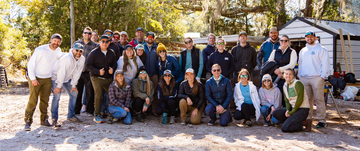Just one oyster filters 50 GALLONS of water each day. You read that right, so you can see how crucial oysters are to our environment. Not only was it an amazing day spent outside bundled up in the winter sun, but it also felt so good to be doing something to benefit our environment.

A huge thanks to our friends at Lowcountry Land Trust for organizing this event. Our friends at Rheos Nautical Eyewear donated sunglasses for participants, and we were excited to provide customized UPF 50+ shirts for the volunteers!
The experts at the S.C. Oyster Recycling and Enhancement Program with S.C. Department of Natural Resources taught us so much. We definitely walked away understanding more about the importance of oysters to our environment and the dangers they face.
It was a phenomenal day working together to “Protect Land and Water Forever.”
Why Is Restoring Oyster Reefs Important?
Oysters are crucial to water filtration. But, due to over-harvesting, poor water quality, loss of habitat, erosion, pollution, and more, oyster populations are declining around the world. A new reef restoration method - called a Manufactured Wire Reef - has been developed to help maximize efforts, and we recently helped build them. Learn more about Oyster Restoration on the SCDNR website.
What are Manufactured Wire Reefs?
The wire reefs are similar to crab traps. They're rectangular in shape with a hollow center. We made them with metal netting, coconut husk, and clean, recycled oyster shells.
How are the Wire Reefs used?
Oysters are broadcast spawners. Fertilization occurs in the water. Baby oysters, also called spat, look for a hard surface to settle on - preferably another oyster shell. So, they are attracted to recycled oyster shells placed in the wire cage reefs. They're built to be stable but also allow for water flow. They provide an essential foundation for new oysters to grow.

Why Are Oyster Reefs in Danger?
When mature oysters are harvested as a food source, the shell, serving as a vital substrate, is taken out of the ecosystem. Failure to replenish this shell leads to habitat loss. Additional factors include the detrimental effects of boat wakes, particularly in smaller creeks, and elevated silt levels due to extensive land development. (Source: SCDNR)
How Can You Help Restore Oyster Reefs?
- Recycle Oyster Shells! Find out why and where on the DNR website.
- Volunteer! Check out the list of events at Lowcountry Land Trust and SC DNR.








